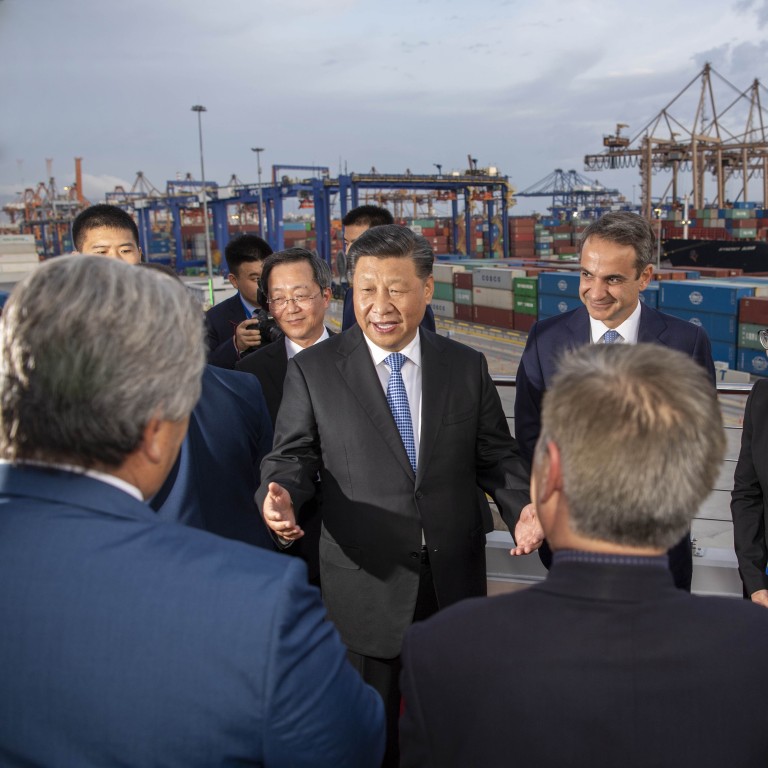
Why Xi Jinping drew on Greece’s ancient past to forge future ties with China
- The Chinese president played up the two countries’ long history to frame a modern economic relationship, observers say
In a letter published in Greek newspaper Kathimerini on Sunday, Xi highlighted parallels between China and Greece as “great ancient civilisations”.
“More than 2,000 years ago, the lights of ancient China and ancient Greece were reflected in the two sides of the Eurasian continent,” he said.
The appeal is part of a broader push to strengthen relationships with a country that has signed on to China’s Belt and Road Initiative and agreed to Chinese development of its major shipping port.
For China, Greece is a foothold in the EU, which earlier this year named China a “systemic rival”.
Xi continued the historical theme in talks on Monday with Prime Minister Kyriakos Mitsotakis, saying that as “ancient civilisations” the countries should together “contribute to human progress”.
Greek President Prokopios Pavlopoulos, reciprocated, saying their ancient cultures were the “fundamental anchor” of China-Greece relations, according to Greek media reports.
Xi Jinping hails Greece deals as model for Chinese cooperation with Europe
Rhetoric about historical ties has been an important part of China’s belt and road diplomacy, helping to frame Xi’s flagship international development plan as part of the historic Silk Roads trading routes.
Tim Winter, a professor at the University of Western Australia in Perth, said China’s references to the past were an attempt to frame Greece not just as a European civilisation but an Asian one as well.
“With this language … China is bringing Greece into its fold of ‘win-win’ cooperation, saying we’ve been connected for thousands of years through the Silk Road, and Greece is as much connected to Asia as it is connected to Europe,” Winter said.
He said Beijing also alluded to China and Greece’s shared experience of being “humiliated by the West”, such as the EU’s handling of Greece’s financial crisis and China’s effective colonisation by European nations in the 19th century.
“A revival of the Silk Road through the belt and road gives them a way to revive their civilisational identities,” Winter said.
These identities were in the spotlight earlier this year when Greece took part in China’s Conference on Dialogue on Asian Civilisations in Beijing.
The conference aimed to build a “shared future for Asia” and dialogue between civilisations, running counter to a senior US official who had compared China’s differences with the United States to a “clash of civilisations”.
Pavlopoulos, who attended the May conference, said at that time that the US rhetoric was a mistake.
“It is in the interests of both China and the West, and Europe, to work together … because this economic cooperation will be the basis for a wider cooperation and co-creation at the international level,” he was quoted by Greek media as saying.
Greece set to welcome Chinese President Xi Jinping as EU, US look on with concern
Other world leaders, including Indian Prime Minister Narendra Modi and Russian President Vladimir Putin, have also used “civilisational thinking” to frame and justify their geopolitical ambitions, according to James Dorsey, a senior fellow at the S. Rajaratnam School of International Studies at the Nanyang Technological University in Singapore.
“This is much more about power and ensuring the survival of power than it is about the framework that you are going to use to negotiate the contracts for the Port of Piraeus,” said Dorsey, who is also a senior fellow at the National University of Singapore’s Middle East Institute.
But Xi’s interest in presenting a shared vision for Greece and China might also be at home, according to Michael Keane, a professor of Chinese media at Curtin University, also in Perth.
“This [rhetoric] is also directed at the people back in China, so he is saying this with a view to telling people back in China that the Chinese civilisation is relevant to the rest of the world, including Greece, so he’s using it for his own aims in maintaining hegemony in China,” Keane said.
“The more you hit the civilisation theme, the more you get people to feel that China is being revitalised.”
Xi’s state visit ended on Tuesday and resulted in the signing of 16 deals, including investment agreements and an extradition treaty.
The two countries also signed a memorandum of understanding for continued development of Chinese shipping giant Cosco’s plans to expand Greece’s Port of Piraeus, which is on track to become the busiest container port in the Mediterranean.

